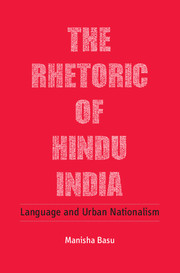Book contents
- Frontmatter
- Dedication
- Contents
- Preface
- 1 Introductory Matters: The Strange Case of Secular India
- 2 Time's Victims in a Second Republic: New Histories, New Temporalities
- 3 To Make Free and Let Die: The Economics of Metropolitan Hindutva
- 4 A Power over Life and Rebirth: V. D. Savarkar and the Essentials of Hindutva
- 5 Between Death and Redemption: Hindu India and its Antique Others
- 6 The After-Life of Indian Writing in English: Telematic Managers, Journalistic Mantras
- Bibliography
- Index
4 - A Power over Life and Rebirth: V. D. Savarkar and the Essentials of Hindutva
Published online by Cambridge University Press: 23 July 2017
- Frontmatter
- Dedication
- Contents
- Preface
- 1 Introductory Matters: The Strange Case of Secular India
- 2 Time's Victims in a Second Republic: New Histories, New Temporalities
- 3 To Make Free and Let Die: The Economics of Metropolitan Hindutva
- 4 A Power over Life and Rebirth: V. D. Savarkar and the Essentials of Hindutva
- 5 Between Death and Redemption: Hindu India and its Antique Others
- 6 The After-Life of Indian Writing in English: Telematic Managers, Journalistic Mantras
- Bibliography
- Index
Summary
Vinayak Damodar Savarkar (1883–1966) – important revolutionary figure, advocate of proto-fascist communal politics, significant social reformer, genocidal proponent of militarization and violence, man of science and rationality, committed adherent of capitalist industrialization, unimaginative bigot, passionate patriot and patriarchal ideologue of nothing less than grotesque proportions – the appellations that attach to this name have always been numerous, and indeed passionately varied. However, what concerns me in this chapter is neither the debate between Savarkar's sympathizers and his critics along such deeply divided lines, nor the paradoxes and controversies that have led to the persistently varied descriptors that accompany any conversation about him. I am also not interested therefore in attempting to underline the varied aspects of one of the most prominent and controversial leaders of the Akhil Bharatiya Hindu Mahasabha. Rather, for the purposes of an intellectual history of what I have called metropolitan Hindutva, I am drawn to the recent claim from different quarters that his work is perhaps the most noteworthy source for the reappearance in the contemporary Indian context of militant Hindu fundamentalism. Most scholars have argued that what consolidates Savarkar's place as the founding father of present-day Hindu nationalism is an almost pithy 1922 pamphlet-type publication entitled The Essentials of Hindutva, reprinted as Hindutva: Who is a Hindu in 1928. Squarely separating his conceptualization from the dogma of Hindusim as a religion, Savarkar – like Jay Dubashi and Arun Shourie – makes Hindutva a cultural, historical and political essence, which, only as such a congealed singularity, could function as grounds for his imagining of the strongly militarized national form of Hindustan. The theoretical beginnings of political-cultural Hinduness, in this sense, can actually be traced back earlier than Savarkar's 1922 pamphlet to the thinking of the nineteenth-century Vedantic scholar Brahmabandhav Upadhyay (1861–1907). But there is no doubt that the discursive strength and visibility of the term today is an effect of Savarkar's thinking as it emerged with and consolidated itself in the publication of Hindutva.
- Type
- Chapter
- Information
- The Rhetoric of Hindu IndiaLanguage and Urban Nationalism, pp. 101 - 132Publisher: Cambridge University PressPrint publication year: 2016



